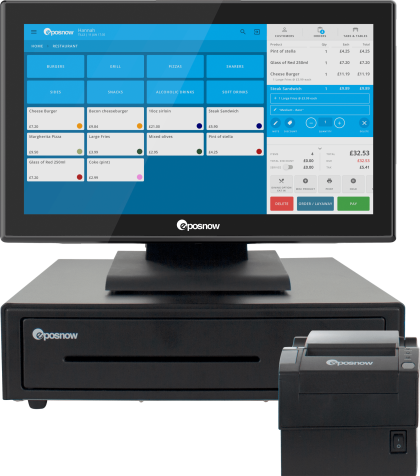Point of Sale: Your Secret Weapon to Fight Dead Stock
As a retail or hospitality business, there's nothing worse than spending money on inventory that doesn't sell. This is commonly referred to as "dead stock."
Dead stock can be a real issue for businesses of all sizes, but it's particularly troublesome for small businesses that may not have the same deep pockets as their larger counterparts.
You may be thinking, "How can I get rid of dead stock?" or "What is the best way to manage inventory?"
The answer: a cloud-based electronic point of sale (EPOS) system with built-in inventory management features.
If you're unsure what dead stock is or how an EPOS system can help, read on for a complete guide.
Dead Stock Meaning
Dead stock is unsold inventory taking up valuable space in your store or warehouse. This can happen for a variety of reasons, such as:
- You ordered too much of a particular product, and it didn't sell as well as you thought it would.
- A product went out of style before you had a chance to sell it.
- A product was damaged and can't be sold as new.
- You overstocked a particular item in anticipation of demand that never materialised.
Whatever the reason, dead stock is a significant problem for businesses because it ties up capital that could be used elsewhere. Not to mention, it takes up valuable storage space that could be used for products that are selling.
The goal is to sell your dead stock as quickly as possible so you can free up space and reinvest the money in inventory that will actually turn a profit.
How a POS System Can Help
A point of sale system can be a powerful tool for managing dead stock. Here's how:
Automated inventory management
A good POS system will automatically track your inventory levels in real-time, so you always know what's in stock and what needs to be ordered. Stock management software takes the guesswork of what you may need and helps you avoid over-ordering products that may not sell.
Let's say you run a boutique and you're considering ordering a new shipment of dresses. You can use your EPOS system to look up how many of the same style dresses you currently have in stock and how many have sold in the past. If you see that you have a large number of dresses in inventory and it hasn't been selling well, you may decide to pass on the new shipment.
Everything you need to trade in one package
Serve customers, take payments, and run your entire business from a single EPOS system.
- High-definition 15.6” Touch Screen point of sale system
- Wi-Fi, and ethernet enabled
- Powerful EPOS Software with over 100 app integrations
- Online, delivery, collection, and multi-channel ready
- Integrated with major payment providers
- Secure Cash Drawer and High-Speed Printer
- Personalised onboarding and product training

Quick and easy reordering
When it's time to reorder dead stock, a POS system makes the process of order management quick and easy. With just a few clicks, you can add items to your next order and have them shipped directly to your store.
For example, if you own a restaurant and you're running low on certain ingredients, you can use your POS system to place a reorder with your supplier. This is much faster and more efficient than calling or faxing in an order. You can even set up automatic reordering, so you never have to worry about running out of stock.
Detailed sales reports
EPOS systems generate detailed functional reports that can help you identify slow-moving products. This information is valuable for deciding what to do with your dead stock. For example, you may decide to mark down certain items to clear them out quickly or discontinue them altogether.
Suppose you own a hair and beauty salon and notice that a certain product isn't selling well. You can use your EPOS system to pull up a report of all the sales for that product over the past few months. If you see that it's been consistently sitting on your shelves without selling, you may decide to discontinue it and sell products that are more popular. Or, a detailed report may reveal that the product only sells well during certain seasons so that you can adjust your ordering accordingly.
Improved customer service
Customers who can't find what they're looking for will likely leave your store empty-handed. An EPOS system can help you avoid this by giving you up-to-the-minute information about what's in stock. This way, you can quickly and easily locate items for customers, even if they're hidden away in the back of your store.
Let's say you have a customer who's looking for a particular dress that's out of stock. If you have an EPOS system, you can check to see if the dress is available at any of your other locations. Or, you can use the system to place a special order for the customer, so they can get the dress as soon as it arrives in your store.
Increased profits
By using an EPOS system to manage your dead stock, you can free up capital, increase your profit margins, and reinvest in inventory that will actually sell.
Some of the ways you can increase profits include:
- Selling items at a discount: When products are sitting on your shelves and not selling, you're essentially losing money. You can use your POS system to mark down items, so they sell quickly and you don't take a hit on your profits. Or give them away as a free gift with every purchase.
- Discontinuing slow-moving items: If certain items are consistently not selling, it may be time to discontinue them altogether. This will help you save on costs and avoid tying up capital in dead stock.
- Reinvesting in inventory that sells: Once you've cleared out your dead stock, you can use the money you've saved to reinvest in inventory that actually sells.
Final Thoughts
An EPOS system is a powerful tool for managing dead stock. With its help, you can make quick and informed decisions about what to do with slow-moving items. This, in turn, can free up capital, increase your profits, and improve customer experience.
Want to know how Epos Now can help you manage your stock? Get in touch with our team of experts today!




